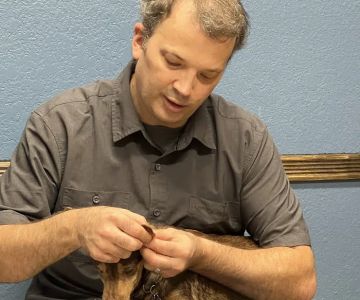Can Veterinary Nurses Diagnose? Understanding Their Role in Veterinary Care
- 1. The Role of Veterinary Nurses in Diagnosis
- 2. Training and Qualifications: What Veterinary Nurses Can Do
- 3. How Veterinary Nurses Collaborate with Veterinarians
- 4. Real-Life Examples of Veterinary Nurses in Action
- 5. Conclusion: Understanding the Full Scope of a Veterinary Nurse's Role
1. The Role of Veterinary Nurses in Diagnosis
As a pet owner, I’ve often wondered about the role of veterinary nurses and whether they have the ability to diagnose conditions in animals. It’s common to assume that only veterinarians have the authority to make a diagnosis, but the reality is a bit more nuanced. Veterinary nurses play a critical role in the care and treatment of pets, often working closely with veterinarians to assess and monitor animals’ health. However, it’s important to understand the boundaries of their responsibilities when it comes to making a diagnosis.
While veterinary nurses have extensive training in animal care and can perform certain diagnostic tasks, they are not licensed to make an official diagnosis. This responsibility typically lies with a licensed veterinarian, who has the medical expertise required to diagnose illnesses or conditions. However, veterinary nurses often assist in the diagnostic process by conducting initial assessments, gathering vital information, and preparing pets for examination by a veterinarian.
2. Training and Qualifications: What Veterinary Nurses Can Do
Veterinary nurses undergo rigorous training, which equips them with a variety of skills necessary for animal care. Their qualifications vary depending on the country and the specific veterinary program, but in general, they are well-trained professionals with a deep understanding of animal anatomy, behavior, and common medical conditions.
In the United States, veterinary nurses (often referred to as veterinary technicians) typically complete a two-year associate degree in veterinary technology, which includes both classroom instruction and hands-on experience. This education covers subjects such as animal nursing, pharmacology, anesthesiology, and laboratory techniques. Upon completion of their degree, veterinary nurses must pass a national exam to become licensed and are often required to complete continuing education to maintain their credentials.
Although veterinary nurses cannot make an official diagnosis, their training allows them to perform a variety of diagnostic support tasks, such as taking blood samples, conducting radiographic imaging, and performing physical examinations. They can also help with monitoring anesthesia, providing pain management, and offering post-surgical care—all of which are vital to a pet’s health and recovery.
3. How Veterinary Nurses Collaborate with Veterinarians
Veterinary nurses and veterinarians work closely together in the diagnostic process. While veterinary nurses are not able to make formal diagnoses, they gather essential information that helps veterinarians make informed decisions. For instance, a veterinary nurse might take note of a pet’s vital signs, such as temperature, heart rate, and respiration, and report these findings to the veterinarian. This information can provide important clues about the pet’s condition and guide the veterinarian in making a diagnosis.
Additionally, veterinary nurses assist with diagnostic tests, such as blood work or urinalysis. They are often responsible for collecting and preparing samples for laboratory analysis, ensuring that the tests are performed accurately and efficiently. Veterinary nurses also help with interpreting test results, providing the veterinarian with valuable insights into the pet’s health status.
4. Real-Life Examples of Veterinary Nurses in Action
Let me share a real-life example of how a veterinary nurse’s expertise can make a significant difference in the care of an animal. A few months ago, I took my dog, Max, to the vet for a routine check-up. During the visit, the veterinary nurse conducted a thorough physical examination, noting that Max seemed to have a slightly elevated heart rate. She also observed that he was more lethargic than usual, which was unusual for him.
Based on these observations, the veterinary nurse suggested that Max undergo some diagnostic tests, including blood work and an ECG to monitor his heart function. The test results revealed that Max had an underlying heart condition, which was not immediately obvious from the external examination alone. Thanks to the veterinary nurse’s keen observations and careful monitoring, Max’s condition was caught early, allowing the veterinarian to begin treatment before the condition worsened.
This example highlights the critical role that veterinary nurses play in the diagnostic process. While they may not officially diagnose medical conditions, their attention to detail and ability to spot potential health issues can be invaluable in ensuring that pets receive timely and appropriate care.
5. Conclusion: Understanding the Full Scope of a Veterinary Nurse's Role
In conclusion, while veterinary nurses are not authorized to make official diagnoses, their role in veterinary care is undeniably important. They play a key part in supporting veterinarians and ensuring that pets receive high-quality care. From taking vital signs and conducting diagnostic tests to assisting with post-surgical recovery, veterinary nurses help ensure that animals are treated with the best possible care.
If you’re a pet owner, it’s essential to recognize the invaluable contributions of veterinary nurses. Their training and expertise in animal care make them an integral part of the veterinary team. Next time you visit your vet, take a moment to appreciate the hard work and dedication of the veterinary nurses who help keep your pet healthy and happy.











